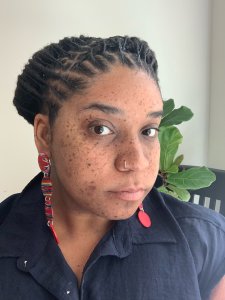Presented By: Science, Technology and Society
CANCELLED. STS Speaker Series. From Biosociality to Biomythography: Toward a Postgenomic Contemporaneity of African Ancestry
Victoria Massie, Rice University

For the past two decades, genetic ancestry testing has become one of the quintessential examples of biosociality, providing scholars in the anthropology of science and medicine language to not grapple with how social inequalities like race have been at risk of reification through genetic information. Drawing on ethnographic fieldwork on genetic reconnection programs in Cameroon, this talk asks how we might consider the limits of biosociality for grappling with the contours of postgenomic contemporaneity. How could a reframing of the knowledge production processes involving African ancestry challenge the biosocial telos? And how might biomythography provide an important methodology for reexamining the multiscalar processes of racialization that are (and are not) taking shape amongst “contemporaneous” ancestors?
Bio: Victoria M. Massie is an Assistant Professor of Anthropology at Rice University, and a faculty affiliate in the Center for African and African American Studies, the Medical Humanities Program, the Science & Technology Studies Program, and the Center for Women, Gender and Sexuality Studies. Mobilizing Black feminist theory at the intersection of medical anthropology and the anthropology of science, Massie's work seeks to address contemporary processes of racializing Blackness by considering how ideas of the biological and embodiment are being reconfigured in the 21st century. Additionally, Massie is committed to experimenting with ethnographic form, including her first book project, Prospecting Return: A Biomythography of Genetic African Ancestry. Drawing on ethnographic fieldwork conducted in the United States and Cameroon from 2010 to 2018, Prospecting Return examines how the emergence of genetic reconnection programs in tandem with Cameroon's 50th anniversary of independence mobilize the genetic Cameroonian diaspora to prospect new postcolonial fates through their potential permanent return. Her work has been generously supported by fellowships from the Mellon Foundation, the National Science Foundation, the Fulbright Foundation, and Wenner Gren, as creative fellowships from Hurston/Wright Foundation for Nonfiction, and Voices of Our Nations Arts (VONA) Foundation for Fiction and Experimental Poetry. She received her Ph.D. in Sociocultural Anthropology from the University of California, Berkeley.
Co-sponsors: Department of African and Afroamerican Studies
Bio: Victoria M. Massie is an Assistant Professor of Anthropology at Rice University, and a faculty affiliate in the Center for African and African American Studies, the Medical Humanities Program, the Science & Technology Studies Program, and the Center for Women, Gender and Sexuality Studies. Mobilizing Black feminist theory at the intersection of medical anthropology and the anthropology of science, Massie's work seeks to address contemporary processes of racializing Blackness by considering how ideas of the biological and embodiment are being reconfigured in the 21st century. Additionally, Massie is committed to experimenting with ethnographic form, including her first book project, Prospecting Return: A Biomythography of Genetic African Ancestry. Drawing on ethnographic fieldwork conducted in the United States and Cameroon from 2010 to 2018, Prospecting Return examines how the emergence of genetic reconnection programs in tandem with Cameroon's 50th anniversary of independence mobilize the genetic Cameroonian diaspora to prospect new postcolonial fates through their potential permanent return. Her work has been generously supported by fellowships from the Mellon Foundation, the National Science Foundation, the Fulbright Foundation, and Wenner Gren, as creative fellowships from Hurston/Wright Foundation for Nonfiction, and Voices of Our Nations Arts (VONA) Foundation for Fiction and Experimental Poetry. She received her Ph.D. in Sociocultural Anthropology from the University of California, Berkeley.
Co-sponsors: Department of African and Afroamerican Studies